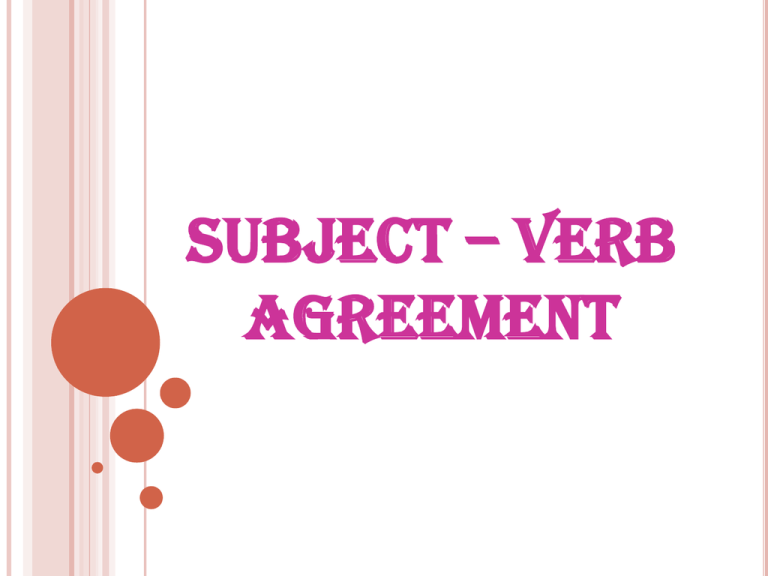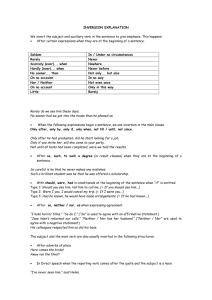SUBJECT – VERB AGREEMENT
advertisement

SUBJECT – VERB AGREEMENT MAKE VERB AGREE AFTER EXPRESSIONS OF QUANTITY EXAMPLE : # All of the book was interesting. # All of the books were interesting. # All of the information was interesting. What is your conclusion ? SUBJECT – VERB AGREEMENT AFTER EXPRESSIONS OF QUANTITY ALL MOST OF THE (OBJECT) SOME HALF + VERB MAKE VERB AGREE AFTER CERTAIN WORDS EXAMPLE : # Everybody is going to the theater. # Everybody are going to the theater. # Somebody is watching you. # Somebody are watching you. Which one is correct ? SUBJECT – VERB AGREEMENT AFTER CERTAIN WORDS These words are grammatically singular, so they need singular verb Anybody Anyone Anything Everybody Everyone Everything Each + Noun Every + Noun Nobody No one Nothing Somebody Someone Something EXERCISE : 1. 2. 3. 4. 5. 6. 7. 8. 9. 10. Some of the animals was released into the zoo. Half of the food are still in the refrigerator. Most of the people in the room from Indonesia. All students are required to turn in their paper. Most of the trouble was resolved within a few weeks. The president felt that no one were better than him. Every man in this line are required to sign the form. It is impossible to believe that somebody actually admire you. Anything is possible if a person tries hard enough. Each of the doctors needs to have good medical skills. MAKE INVERTED VERB AGREE EXAMPLE : # Behind the house was the bicycle I wanted. # Behind the house was the bicycles I wanted. # Behind the houses were the bicycles I wanted. # Behind the houses were the bicycle I wanted. Which one is correct ? SUBJECT – VERB AGREEMENT AFTER INVERTED VERB Place Expressions Question Words Negative Expressions Conditions without If Comparisons Verb + Subject INVERT THE SUBJECT AND VERB WITH PLACE EXPRESSIONS EXAMPLE : # Here is the book that you lent me. # There are the keys that I thought I lost. * In the forest are many exotic birds. * In the forest I walked for many hours. Can you see the difference in the * ? INVERTED SUBJECT – VERB WITH PLACE EXPRESSIONS When a place expression at the front of the sentence is necessary to complete the sentence, the subject and verb that follow are inverted. When a place expression at the front of the sentence contains extra information that is not needed to complete the sentence, the subject and verb that follow are not inverted. INVERT THE SUBJECT AND VERB WITH QUESTION WORDS EXAMPLE : # She was sick yesterday. # Was she sick yesterday? * What is the homework? * I do not know what the homework is. Can you see the difference in the * ? INVERTED SUBJECT – VERB WITH QUESTION WORDS ( WHAT, WHO, WHEN, WHERE, WHY, HOW ) When the question word introduces a question, the subject and verb that follow are inverted. When the question word connects two clauses, the subject and verb that follow are not inverted. INVERT THE SUBJECT AND VERB WITH NEGATIVE EXPRESSIONS EXAMPLE : # Not once did I miss a question. # Never has he taken a vacation. * Only once did I miss a question. * Hardly ever has he taken a vacation. # negative * almost negative INVERTED SUBJECT – VERB WITH NEGATIVE EXPRESSIONS NO NOT ONLY HARDLY BARELY V+ S NEVER NEITHER RARELY SCARCELY SELDOM NOR INVERT THE SUBJECT AND VERB WITH CONDITIONALS EXAMPLE : # If he had taken more time, the results would have been better. # Had he taken more time, the results would have been better. # I would help you if I were in a position to help. # I would help you were I in a position to help. # If you should arrive before 6, just give me a call. # Should you arrive before 6, just give me a call. INVERTED SUBJECT – VERB WITH CONDITIONALS When the verbs in the conditional clause are had, were, should, it is possible to omit if and invert the subject and verb. INVERT THE SUBJECT AND VERB WITH COMPARISONS EXAMPLE : # My sister spends more hours in the office than John does. # My sister spends more hours in the office than does John. Which one is correct ? INVERTED SUBJECT – VERB WITH COMPARISONS In comparisons, the following structures are both possible: * S + V + Comparison + S + V * S + V + Comparison + V + S Note: A subject – verb inversion after a comparison sounds rather formal.








